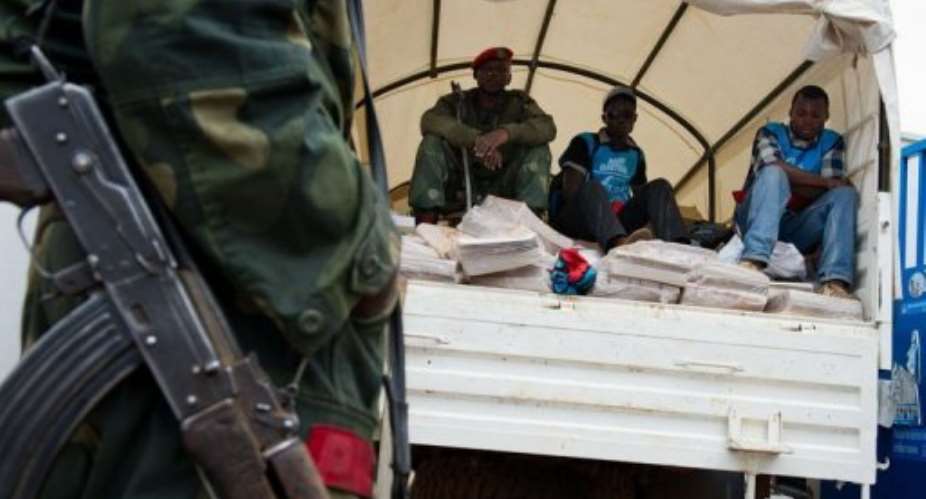HARARE (AFP) - Regional mediators on Monday called for free and fair elections in Zimbabwe on July 31 as problems with early voting sent warning signals for the key presidential and parliamentary polls.
The Southern African Development Community (SADC), which brokered a power-sharing deal between President Robert Mugabe and his rival Prime Minister Morgan Tsvangirai after Zimbabwe's 2008 election descended into violence, urged political players, security forces and the election commission to "exercise restraint and avoid frustrating voters".
"Voters must have unfettered access. That's what will make the elections free and fair. The conduct must go hand in hand with discipline of the highest order," Bernard Membe, who is heading the SADC's election observer mission, told a press conference.
The 15-member regional bloc will deploy 442 observers to cover 210 constituencies across the southern African nation in the upcoming polls, which will end the uneasy power-sharing deal and determine whether Mugabe, 89, extends his 33 years in power.
The African Union will also send observers, but Zimbabwe has refused missions from Western nations.
Local election monitors meanwhile called on the Zimbabwe Electoral Commission (ZEC) to extend early voting for thousands of police officers, which started on Sunday but was marred by chaos.
Polling stations opened late and many lacked indelible ink, stamps, voter rolls and ballot papers and boxes.
"The process continues to be disorganised, an indication that ZEC was unprepared to conduct the special voting process," said Zimbabwe Election Support Network chair Solomon Zwana.
The problems were an ominous signal ahead of the upcoming vote, he added.
The group was "seriously concerned that the chaos that prevailed during the special voting process serves as a telling and worrying indicator that could repeat itself," he said.
Police spokeswoman Charity Charamba conceded two days were not enough for the voting.
"Indications on the ground are that it is now clear that members and officers of the Zimbabwe Republic Police have been unable to exercise their constitutional right to vote," she said.
Charamba refused to blame election organisers for the delays, denouncing instead Tsvangirai's Movement for Democratic Change for in-fighting between dissident election candidates.
"The Zimbabwe Electoral Commission was therefore unable to print ballot papers as they did not have the final list of candidates," she said.
Security chiefs openly support Mugabe and his ZANU-PF party, and have blasted Tsvangirai as a stooge of the West.
The security forces, which fall under Mugabe's control, have in the past been accused of rights abuses and intimidating political opponents.
Mugabe and Tsvangirai formed their power-sharing government a year after the violent and disputed polls of 2008.
Tsvangirai, 61, won the first round of that vote, but pulled out of the runoff after around 200 opposition activists were killed.
The tenure of the compromise government has been marked by frequent haggling and allegations of political violence.
Tsvangirai has deplored the lack of reform in the security forces as well as the media, and has protested against Mugabe's unilateral declaration of an election date.
But the vote is going ahead after the Constitutional Court upheld the date, leaving only a month for campaigning.
The country also lacks much of the $132 million (101 million euros) to organise the poll.
SADC Executive Secretary Tomaz Salomao implored the nation to conduct a credible vote.
"We therefore urge the people of Zimbabwe to demonstrate their political maturity by upholding democratic values, principles and practices," said Salomao.
Mugabe however has threatened to abandon the regional bloc -- one of its last allies -- if it interferes in the polls.
Violence, intimidation and allegations of stuffing voters' rolls with "ghost voters" have long marred Zimbabwe's elections.





 Former Kotoko Player George Asare elected SRC President at PUG Law Faculty
Former Kotoko Player George Asare elected SRC President at PUG Law Faculty
 2024 elections: Consider ‘dumsor’ when casting your votes; NPP deserves less — P...
2024 elections: Consider ‘dumsor’ when casting your votes; NPP deserves less — P...
 You have no grounds to call Mahama incompetent; you’ve failed — Prof. Marfo blas...
You have no grounds to call Mahama incompetent; you’ve failed — Prof. Marfo blas...
 2024 elections: NPP creates better policies for people like us; we’ll vote for B...
2024 elections: NPP creates better policies for people like us; we’ll vote for B...
 Don’t exchange your life for wealth; a sparkle of fire can be your end — Gender ...
Don’t exchange your life for wealth; a sparkle of fire can be your end — Gender ...
 Ghana’s newly installed Poland train reportedly involved in accident while on a ...
Ghana’s newly installed Poland train reportedly involved in accident while on a ...
 Chieftaincy disputes: Government imposes 4pm to 7am curfew on Sampa township
Chieftaincy disputes: Government imposes 4pm to 7am curfew on Sampa township
 Franklin Cudjoe fumes at unaccountable wasteful executive living large at the ex...
Franklin Cudjoe fumes at unaccountable wasteful executive living large at the ex...
 I'll 'stoop too low' for votes; I'm never moved by your propaganda — Oquaye Jnr ...
I'll 'stoop too low' for votes; I'm never moved by your propaganda — Oquaye Jnr ...
 Kumasi Thermal Plant commissioning: I pray God opens the eyes of leaders who don...
Kumasi Thermal Plant commissioning: I pray God opens the eyes of leaders who don...
